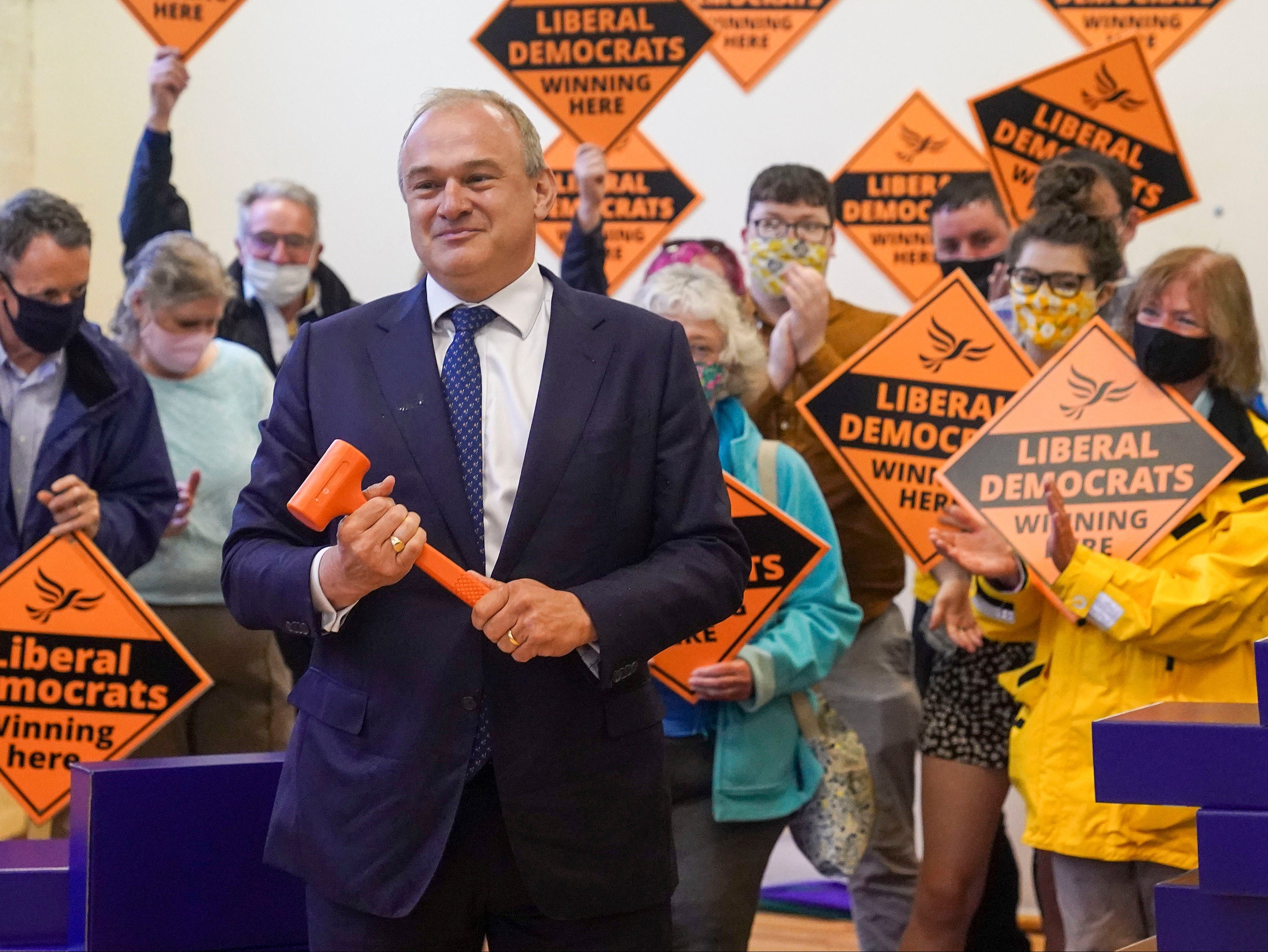Time for Keir Starmer and Ed Davey to have a friendly chat
The by-election shows the Lib Dems can play a vital role in the tactical voting needed for opposition parties to have any chance of ousting the Tories at the next general election, writes Andrew Grice


The Liberal Democrats’ stunning victory in the Chesham and Amersham by-election shows the Conservatives can no longer take for granted their “blue wall” in the south of England.
The result did not come as a surprise to jittery Tory backbenchers, who saw the warning signs when the Lib Dems, Labour and the Greens made unexpected gains at last month’s local elections in parts of Oxfordshire, Surrey, Kent, West Sussex and Cambridgeshire. These Tories believe their party’s “southern discomfort”, a label traditionally attached to Labour, is due to Boris Johnson’s relentless showering of attention and money on the red wall in the North and Midlands. Ironically, the Tories now face the mirror image of Labour’s red wall problem, being accused of “neglecting” areas that feel “left behind”.
Johnson is reaping what he sowed. His ministers announce new projects and resources for the red wall every week. Although they deny the charge of US-style pork barrel politics, this investment is skewed towards Tory-held seats. While it wasn’t the only factor, a perception that voting Tory would “bring money to our town” played a part in the Tories’ highly symbolic victory in last month’s Hartlepool by-election.
People in the south can read headlines about new money too. In Chesham and Amersham, the tables were turned. The grumbling of Tory backbenchers outside the red wall will now get louder; they will justifiably tell Tory whips: “We told you so.” Johnson’s MPs will become more rebellious; once you have defied the whip once, it is easier to do so again. This week, 49 voted against extending coronavirus restrictions for another four weeks. It will not feel to Johnson that he enjoys a commanding majority of about 80; his party management problems can only get worse.
He will come under enormous pressure to dilute his proposed shake-up of planning laws, a move aimed at allowing more housebuilding. As I noted, the Lib Dems made this the big issue from the outset of the Chesham and Amersham campaign. They were wary of opposing the HS2 rail line, also a bone of contention locally, because they had backed the project in parliament, but their candidate Sarah Green displayed her own scepticism to good effect.
Johnson should not wobble over housebuilding. He has already made one tactical retreat, by changing the formula which decides where new homes should be built, after complaints that too many would be in the Tory shires. But he should stick to his guns. If he doesn’t, another government will miss the chance to tackle Britain’s housing crisis.
Standing firm is also in the Tories’ self-interest. As those anxious backbenchers have told government whips, many young adults are moving out of London to the home counties, where housing is cheaper. The trend is likely to increase because of the pandemic, as more people work from home for at least part of the week on a permanent basis. This exodus will eventually change the demographics of the blue wall; the Tories’ solid block of support among older voters will be weakened over time. Even if they retain their new red wall voters, they will need to win over a new generation in the south to keep their election-winning coalition intact. Many of the new arrivals in the southern constituencies will not be natural Tories but middle-class graduates and social liberals who voted Remain.
Again, Johnson might be hoist with his own petard. He is deliberately prolonging Brexit’s shelf life, seeing the issue as Keir Starmer’s weak spot and still a vote-winner in the red wall. But that hardly brings the country together or allows it to finally move on from Brexit. Many Remainers want Johnson to stop punching the bruise; as Chesham and Amersham shows, they have votes.
The by-election result shows the Lib Dems are still alive and kicking and is a much-needed boost for their leader Ed Davey. It suggests they can play a vital role in the anti-Tory tactical voting that will be needed for opposition parties to have any chance of ousting the Tories at the next general election. Although Labour’s disastrous 1.6 per cent share of the vote was its worst-ever in a parliamentary by-election, according to the elections guru John Curtice, Labour needs the Lib Dems to be back in business.
Neal Lawson, director of Compass, which campaigns for a progressive alliance, said: “With Labour slipping into fourth place behind the Greens, its platform is on fire at both ends as it haemorrhages middle-class and working-class votes. This result shows the Tories can be beaten, but not by Labour on its own. It will take an alliance of progressive parties and voters to win next time.”
A formal electoral pact, with anti-Tory candidates standing aside for each other in some seats, looks beyond reach. The model should be the below-the-radar deal in 1997 under which Tony Blair and the Lib Dem leader Paddy Ashdown agreed to soft pedal their party’s campaign in about 100 seats where the other party had the best shot at defeating the Tories. It contributed to Labour’s landslide.
Time for Starmer and Davey to have a friendly chat.



Join our commenting forum
Join thought-provoking conversations, follow other Independent readers and see their replies
Comments